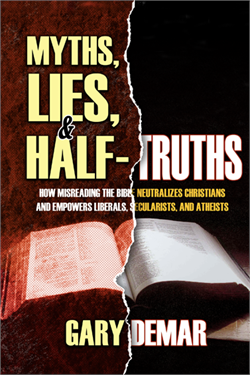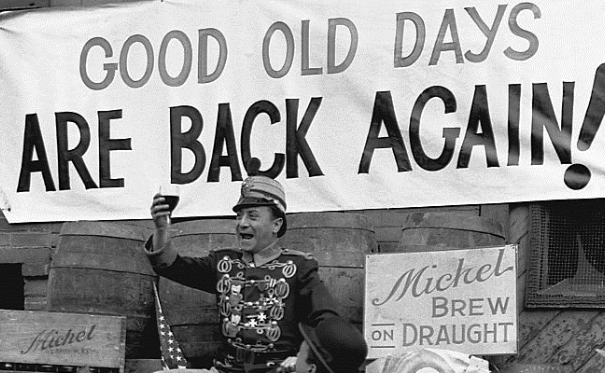“In 1905, a Vermont doctor and his chauffeur were the first to successfully drive a car across the country from San Francisco to New York. It took them 63 days. Today you can fly cross country in a matter of hours while using wireless Internet.” — David Bahnsen
It’s 2024 and to the surprise of many, we’re still here. We don’t know what the future will bring. With that in mind, many people are nostalgic for the past. The writer of the biblical book Ecclesiastes puts the past in perspective when he writes: “Do not say, ‘Why is it that former days were better than these?’ For it is not from wisdom that you ask about this” (7:10).
Matthew Henry’s (1622-1714) comments on this passage are helpful: “The supposition is a foolish reflection upon the providence of God in this world…. One is so much a stranger to the times past, and such an incompetent judge even of the present times, that he cannot expect a satisfactory answer to the enquiry and therefore he ‘does not enquire wisely.’”
Our memory of the past is selective. We tend to block out the bad and remember only the good.

Thinking Straight in a Crooked World
The nursery rhyme "There Was a Crooked Man" is an appropriate description of how sin affects us and our world. We live in a crooked world of ideas evaluated by crooked people. Left to our crooked nature, we can never fully understand what God has planned for us and His world. God has not left us without a corrective solution. He has given us a reliable reference point in the Bible so we can identify the crookedness and straighten it.
Buy NowI was born in 1950. Everything I know about history prior to 1950 has come by way of reading, discussions with people who were there, and modern media presentations of events captured on film. I’ve read how bad things were when hordes of soldiers raped and pillaged, when tyrants ruled by whim, when cheers went up from the crowds when another head dropped in the basket after Madame Guillotine did her work, when mass starvation was the consequence of utopian revolutions that went inevitably bad, when people died of simple infections because antibiotics had not been discovered, when polio struck the healthy until Jonas Salk developed his vaccine, when the Black Death killed tens of millions of people. I could go on, but you get the picture.
I can remember the mechanical washer and wringer or “mangle” that my grandmother used to wash clothes and squeeze out the water. She hung the wet clothes outside on a line to get them dry. Yes, those were the good old days of drudgery, sun up to sun down chores that never went away.
The first manned flight did not occur until 1903 when Wilbur and Orville Wright took to the air at Kill Devil Hill on the coast of North Carolina. Those alive in 1903 saw two men walk on the moon in 1969. Today, a person can fly across the country in less than 4 hours and across the ocean in less than half a day. Christopher Columbus set sail from Southern Spain on August 3, 1492, and arrived in the Bahamas on October 12th — more than a two-month voyage.
There’s the telephone, first invented by Alexander Graham Bell in 1876. Now we have smart phones that are more powerful than the computer that was used to send men to the Moon. Who in the nineteenth century thought such things were possible? Not even Jules Verne envisioned them.
Humorist P. J. O’Rourke wrote, “When you think of the good old days, think ‘dentistry.’” “The greatest invention of the modern world is anesthetics,” Dr. Gary North wrote. “Prior to 1844, in preparation for an operation, you drank booze until you passed out — hopefully. Then the physician — ‘sawbones,’ he was called — got started hacking away.” You can have the “good old days” of just a hundred years ago:
- The average life expectancy in America was 47. “The U.S. Census Bureau projects that 114,000 Americans will be centenarians in 2010, a number expected to swell to 241,000 by 2020.”
- Only 14% of the homes in the U.S. had a bathtub.
- Only 8% of homes had a telephone.
- A three-minute call from Denver to New York City cost $11 when that among was close to $100 dollars today, if you could get through.
- There were only 8,000 cars in the U.S. and only 144 miles of paved roads.
- The average wage in the U.S. was $0.22/hour.
- The average American worker made between $200–$400/year.
The three leading causes of death a hundred years ago in the US were: (1) pneumonia and influenza, (2) tuberculosis, and (3) diarrhea. What’s America’s most publicized health risk today? Obesity! Diet programs are a multi-billion-dollar industry because we have too much food. What a great problem to have.
What was life comparable to before today’s polluting automobile? Do you have any idea what city life was like when hundreds of horses defecated in the streets? During hot days, the manure would dry, and the air would be filled with bacteria-laden dust that people would breathe. When it rained, pedestrians would have to traverse through manure sludge.
Sanitary experts in the early part of the twentieth century agreed that the normal city horse produced between fifteen and thirty pounds of manure a day, with the average being something like twenty‑two pounds. In a city like Milwaukee in 1907, for instance, with a human population of 350,000 and a horse population of 12,500, this meant 133 tons of manure a day, for a daily average of nearly three‑quarters of a pound of manure per person per day. Or, as the health officials in Rochester calculated in 1900, the 15,000 horses in that city produced enough manure in a year to make a pile covering an acre of ground 175 feet high and breeding sixteen billion flies.[1]
The horse population of Chicago was 83,000, and this was after the automobile and electric streetcar had caused a decline in the number of urban horses. In 1880, the cities of New York and Brooklyn had a combined horse population somewhere between 150,000 and 175,000. As one can imagine, keeping the streets clean was a major problem. Some suggested that epidemics of cholera, smallpox, yellow fever, and typhoid were caused by “‘a combination of certain atmospheric conditions and putrefying filth,’ among which horse manure was a chief offender.”[2]
Keeping the streets clean was expensive. Some cities tried to recoup the cost by selling the manure for fertilizer. This caused another unforeseen problem since collecting manure was more profitable than collecting regular trash. Daily refuse often remained in the streets along with the leftover manure. What they wouldn’t have given for a garbage truck and a landfill back then.
The flu epidemic of 1918-1919 killed somewhere between 20 and 40 million people worldwide. We have ways of combating it today.

Myths, Lies, and Half-Truths
Our nation is in a crisis. The world is crying out for answers in the face of bewildering and seemingly unsolvable problems. Myths, Lies, and Half-Truths shows that the Bible has real answers to these problems—answers the church is currently ignoring.
Buy NowSome say the rise of Islam is a sign of the end. People thought the same thing in the 15th century and before that when Islam came into being in the 7th century. Read the opening paragraph to the Prologue of Samuel Eliot Morison’s biography on Christopher Columbus, Admiral of the Ocean Sea (1942):
At the end of the year 1492 most men in Western Europe felt exceedingly gloomy about the future. Christian civilization appeared to be shrinking in area and dividing into hostile units as its sphere contracted. For over a century there had been no important advance in natural science, and registration in the universities dwindled as the instruction they offered became increasingly jejune and lifeless. Institutions were decaying, well-meaning people were growing cynical or desperate, and many intelligent men, for want of something better to do, were endeavoring to escape the present through the study of the pagan past. Islam was now expanding at the expense of Christendom…. The Ottoman Turks, after snuffing out all that remained of the Byzantine Empire, had overrun most of Greece, Albania and Serbia; presently they would be hammering at the gates of Vienna.
Plug in any year where 1492 appears in Morison’s quotation, and his description reads like today’s headlines. Things looked bleak. The world changed in a day when Martin Luther posted a public declaration calling out one of Europe’s major powers on a chapel door in 1517 in Wittenberg, Germany.
A new year brings a lot of hand wringing about the condition of our world. Too often we dwell on the bad and the ugly and dismiss the good as inconsequential or improbable.
[1]Joel A. Tarr, “The Horse—Polluter of the City,” The Search for the Ultimate Sink: Urban Pollution in Historical Perspective (Akron, OK: University of Akron Press, 1996), 323-324.
[2]Tarr, The Search for the Ultimate Sink, 325.

